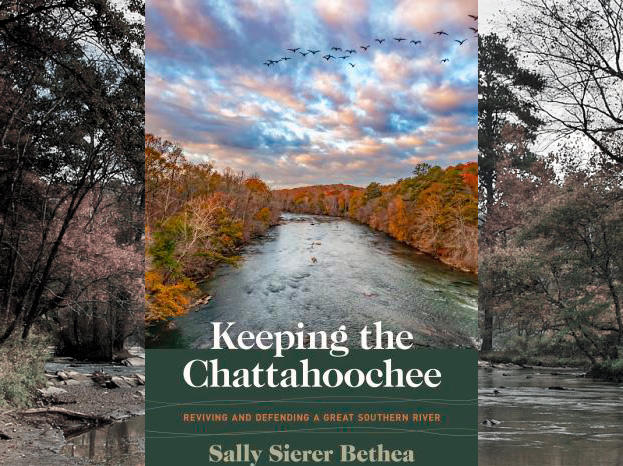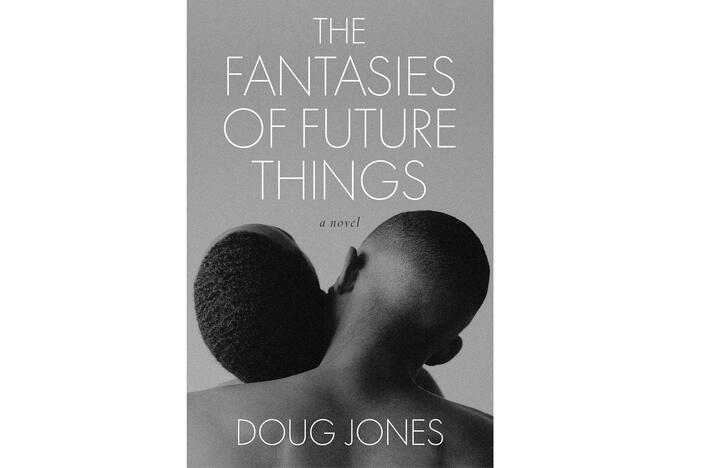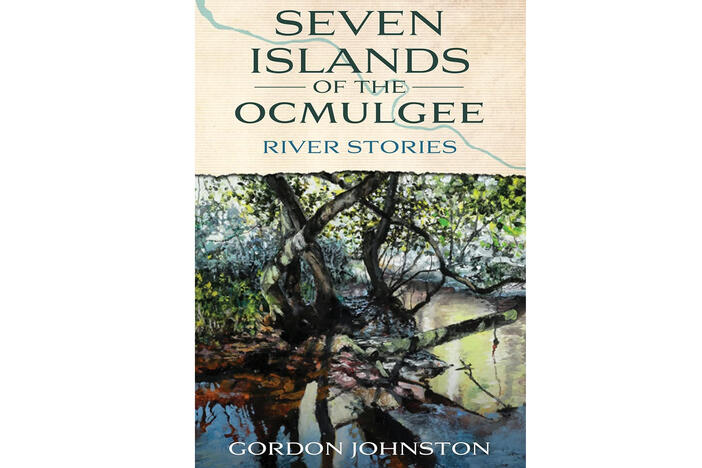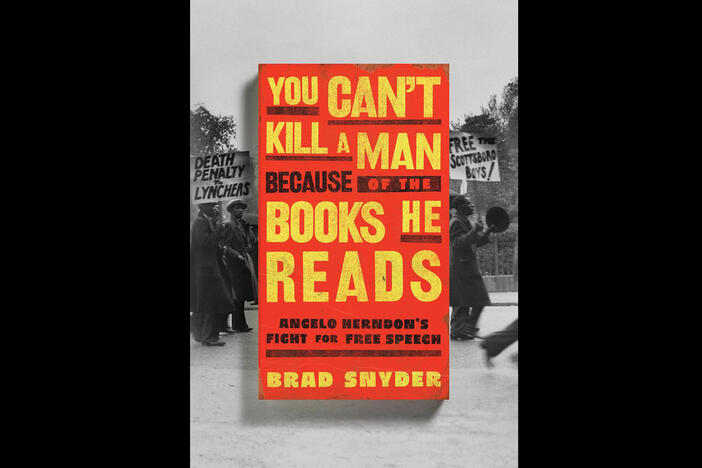
Section Branding
Header Content
Sally Sierer Bethea: Keeping the Chattahoochee
Primary Content
Sally Sierer Bethea was one of the first women in America to become a “riverkeeper”—a vocal defender of a specific waterway who holds polluters accountable. In Keeping the Chattahoochee, she tells stories that range from joyous and funny to frustrating—even alarming—to illustrate what it takes to save an endangered river. In this episode, Peter and Orlando discuss the Hooch, an important water source for so many people.

Orlando Montoya: Coming up in this episode.
Peter Biello: But I had to ask her like, okay, this looks pretty, but is it, you know, if I jump in, am I going to get like a rash? Am I going to get sick?
Orlando Montoya: I want to know is how does she put like the river into a book?
Sally Sierer Bethea: And our rivers don't need to be lined with private property. Public space is what Jimmy Carter gave us for this river.
Peter Biello: This podcast from Georgia Public Broadcasting highlights books with Georgia Connections, hosted by two of your favorite public radio book nerds, who also happen to be your hosts of All Things Considered on GPB radio. I'm Peter Biello.
Orlando Montoya: And I'm Orlando Montoya. Thanks for joining us. As we introduce you to authors, their writings and the insights behind their stories mixed with our own thoughts and ideas on just what gives these works the Narrative Edge.
Peter Biello: All right, Orlando, got a question for you.
Orlando Montoya: Go ahead.
Peter Biello: Have you ever been out to shoot the "Hooch?"
Orlando Montoya: I have not, but I want to. So bad.
Peter Biello: First time I heard that, I was like, What are you talking about? Is that gun-related? Who's shooting what here?
Orlando Montoya: Did you think Hooch was a bad word?
Peter Biello: I had no preconceptions about that word at the time, But I asked right away, like, literally, like, What is this? I'm new here. Please explain to me.
Orlando Montoya: Hooch is the 'hoochee, the Chattahoochee.
Peter Biello: Yeah.
Orlando Montoya: And shooting it is going down in a tube or a raft or a kayak or something. You're going to get wet. You're going to get sun. That's what shooting the Hooch is.
Peter Biello: A lot of sun, apparently. That's the explanation that was given to me. Like, bring a whole bottle of suntan lotion or sunblock and just prepare.
Orlando Montoya: It like must take hours.
Peter Biello: Yeah, it's — it's a long river. It's a long river. And the reason I bring it up today is because I've never done that. But I did read a book about the Chattahoochee, and now I kind of want to. It's a book called Keeping the Chattahoochee, and it's by former Chattahoochee River keeper Sally Bethea. She was a riverkeeper for about two decades. And for this interview, I was actually like, it's a treat. I got out of the studio for this one. It was really fun.
Orlando Montoya: In the field.
Peter Biello: We were in the field, microphone in hand. She asked me to meet her at a parking lot not far from the Chattahoochee River, and of course, "not far" is a relative term because we ended up walking for about 45 minutes through through the woods, through the Chattahoochee River National Recreation Area to the riverbanks. And it was great. It was —it was such a nice day to go.
Orlando Montoya: Well, did you get your feet in the water?
Peter Biello: I did not get — I got close. I got close. But that was all in the interest of getting good sound, right? You want to hear the water?
Orlando Montoya: You had to touch it at least.
Peter Biello: I regret to say I did not.
Orlando Montoya: Well, how — how was the water? What did it look like?
Peter Biello: The water was just beautiful. I mean, like a shining blue. And we were trees all around us. And then, of course, trees across the river. So I grew up in New England. I went to college in Maine, lived in Vermont, lived in New Hampshire. Close your eyes. Open them again. You could have been in any of those states, you know.
Orlando Montoya: Well, I'm from the opposite way: from, from, from South, from Florida and Savannah and the rivers there don't have all that rocky stuff. So I, I really like that the Chattahoochee.
Peter Biello: Is it more swampy where you're from?
Orlando Montoya: You know, it's swampy. It's flat. It doesn't like it doesn't like flow, you know.
Peter Biello: Okay.
Orlando Montoya: I mean, it flows, but not like the Chattahoochee. And by the way, I did kayak and shoot the Hooch, I guess, in Columbus, where they have that whitewater and also up in Helen, where they do the tubing, but just not in this section.
Peter Biello: Okay. Do they call it shooting the hooch when it's outside the Atlanta area, or was it just.
Orlando Montoya: I don't know, I might get some blowback on that. But I think when you shoot the Hooch, it's only right here in the Atlanta area, down in Columbus, it's it's that whitewater. And up in Helen, it's tubing.
Peter Biello: Okay, Maybe our friendly podcast audience will send us a nice email telling us what it actually is called in those other areas. Maybe it is still shooting the Hooch. Who knows? Anyway. Well, I went to the river and when I went, it was shortly after one of those contamination stories. We hear these every now and then. This one was a bacterial contamination in the Chattahoochee. So that — that was in the news. That wasn't really why we went to talking with to talk about her book Keeping the Chattahoochee, of course, and about her time as riverkeeper. But I had to ask her, like, okay, this looks pretty, but is it you know, if I jump in, am I going to get like a rash? Am I going to get sick? You know? And what happens to will it be there forever or does the river heal itself somehow?
Sally Sierer Bethea: Rivers are amazingly resilient if you don't overuse and abuse them too much. If you're looking at bacterial pollution, untreated sewage going into a river, that bacteria will die within three or four days. It's looking for warm bodied mammals to live in, and cold rivers are not where the bacteria like to live. So you stop the sewage spill and you know the river is going to take care of that. What we've seen recently was an ongoing, a chronic problem with Fulton County's Big Creek sewage plant. They're still trying to figure out what happened there. So with bacterial contamination, you stop the source, you can — the river can, for the most part, heal itself. When you're talking about toxic chemicals, things even like DDT and Chlordane, which have been banned for decades and decades, they're still persisting in the fish tissue in some of the fish in this river. You can't just magically clean things like that up.
Orlando Montoya: Now you see bacteria and chemicals. I don't want those words anywhere near my drinking water.
Peter Biello: Absolutely not.
Orlando Montoya: And this, this is a source of drinking water.
Peter Biello: Oh, yeah, definitely is. Bethea told me that this river sustains about 5 million people. And it's not just the Atlanta area. As you mentioned, this goes through Columbus, reaches the southern part of the state. And Georgia, Alabama and Florida occasionally fight about water use from the Chattahoochee. But because so many people depend on this source of water, I asked her about growth right? Because we know Atlanta especially is growing pretty quickly and more and more people are depending on this river. So can this river sustain the addition of so many new people, particularly in the Atlanta area?
Sally Sierer Bethea: We in the recent years, we've had a lot of rain and people seem to forget what it was like back in 2006 to 2009 when we had an exceptional drought. That will happen again. Now, many decision makers, leaders at all levels have tried to put together some plans to better deal with that eventuality. But they have still not come to a result, an outcome that I think will ensure everyone up and downstream is adequately protected, including the river itself. A lot of partisanship. Of course, this river basin straddles three states. So you've got fights Alabama, you've got Georgia, you've got Florida. And we have the capacity to be more careful with our water and more thoughtful.
Peter Biello: So yeah, there are concerns about what this river can sustain.
Orlando Montoya: And when you talk about leaders protecting the river. One leader I'm thinking about is Jimmy Carter. We've been hearing about Jimmy Carter, obviously, for the reasons of his ill health. But didn't he have a central role in protecting this part of the river?
Peter Biello: Oh, yeah. About 45 years ago, he created the Chattahoochee River National Recreation Area, which was where we spoke. We had that interview there. And that decision to create the Chattahoochee River National Recreation Area essentially protected miles of riverfront from development. So when I spoke with Bethea at the banks of the river, asked her about Carter's impact. She essentially pointed across the river and said all those trees could have been private homes and condos if not for Carter.
Sally Sierer Bethea: People love to be beside water. I understand it totally. But we also need green space. We need places where everybody, anyone from any walk of life can come and enjoy the river. And our rivers don't need to be lined with private property. Public space is what Jimmy Carter gave us for this river, and it's helped protect the river as well, the water quality. He was a visionary.
Peter Biello: So she's very appreciative of Jimmy Carter's efforts, that's for sure.
Orlando Montoya: I want to know is how does she put, like, the river into a book?
Peter Biello: Well, she writes about it as, as — it kind of takes like a diary form where she's sort of present in a moment and she's describing it. She's very good with identifying the types of wildlife, the types of plant life out there. There's an equal balance here of science and poetry. Maybe that's the way I should say it: What gives this book the Narrative Edge is that there's a nice balance of science and poetry. She knows the taxonomy. She knows what she's looking at. And she's also just got this genuine love for the outdoors and this particular body of water and everything it sustains. And that comes across on the page, I think. I think readers would appreciate it. I certainly did.
Orlando Montoya: I appreciate you telling me about it.
Peter Biello: That's Keeping the Chattahoochee by riverkeeper — former riverkeeper Sally Bethea.
Orlando Montoya: And this has been Narrative Edge. I'm Orlando Montoya.
Peter Biello: And I'm Peter Biello.
Orlando Montoya: Thanks for listening to Narrative Edge. We'll be back in two weeks with a brand-new episode. This podcast is a production of Georgia Public Broadcasting. Find us online at GPB.org/NarrativeEdge.
Peter Biello: You can also catch us on the Daily GPB News podcast Georgia Today for a concise update on the latest news in Georgia. For more on that and all of our podcasts, go to GPB.org/Podcasts.
Sally Sierer Bethea was one of the first women in America to become a “riverkeeper”—a vocal defender of a specific waterway who holds polluters accountable. In Keeping the Chattahoochee, she tells stories that range from joyous and funny to frustrating—even alarming—to illustrate what it takes to save an endangered river. In this episode, Peter and Orlando discuss the Hooch, an important water source for so many people.







